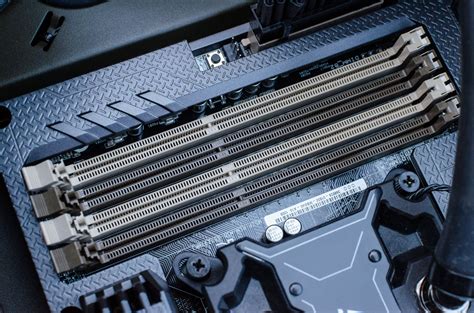Memory Slots: The Ultimate Guide to Optimizing Your Brain's Storage Capacity
Introduction
In the bustling tapestry of our minds, memories form the intricate threads that connect the past, present, and future. They allow us to navigate the complexities of life, form meaningful relationships, and make informed decisions. However, the human brain, like a computer, has a finite amount of storage space for memories. Understanding how memory slots work is crucial for maximizing our cognitive abilities and preserving our precious recollections.
What is a Memory Slot?
A memory slot is an abstract representation of a specific location or region in the brain where memories are temporarily or permanently stored. These slots resemble compartments within a filing cabinet, each housing a unique piece of information or experience.
How Memory Slots Work
Memories are not static entities; rather, they are constantly being encoded, stored, and retrieved in a dynamic process that involves several stages:
Encoding
- Memories begin as sensory information from our surroundings.
- The brain processes this information and assigns it meaning and value.
- The encoded memories are then transferred to a temporary storage area called the hippocampus.
Storage
- From the hippocampus, memories are gradually transferred to more permanent storage locations in the cerebral cortex.
- Different types of memories are stored in different regions of the cortex, such as episodic memories (specific events) in the medial temporal lobe and procedural memories (skills and habits) in the striatum.
Retrieval
- When we need to remember something, the brain sends a retrieval cue to the appropriate memory slot.
- The stored memory is reactivated and brought back into conscious awareness.
Types of Memory Slots
The brain utilizes various types of memory slots to accommodate the vast range of information we encounter:

Short-Term Memory Slots
- Temporary storage areas that hold information for a few seconds or minutes.
- Vital for immediate tasks and decision-making.
- Capacity: Approximately 7 chunks of information at a time.
Long-Term Memory Slots
- Permanent storage areas that retain memories indefinitely.
- Divided into two main categories:
-
Declarative Memory: Consciously accessible memories of facts, events, and experiences.
-
Non-Declarative Memory: Implicit memories related to skills, habits, and emotional responses.
The Importance of Memory Slots
Memory slots play a critical role in our daily lives and overall well-being:
-
Cognitive Function: Enable us to think, learn, and solve problems.
-
Personal Identity: Define who we are and shape our sense of self.
-
Emotional Stability: Allow us to process and regulate our emotions.
-
Social Interactions: Facilitate communication, relationships, and social norms.
Benefits of Optimizing Memory Slots
By understanding and utilizing strategies to optimize memory slots, we can reap numerous benefits:

- Improved academic and professional performance
- Enhanced creativity and problem-solving skills
- Reduced risk of cognitive decline in later life
- Increased confidence and self-esteem
- Greater sense of purpose and meaning
Effective Strategies for Optimizing Memory Slots
Cognitive Enhancement Techniques:

-
Spaced Repetition: Regularly reviewing information to strengthen memory slots.
-
Interleaving: Alternating between different subjects or tasks to improve retrieval efficiency.
-
Mnemonics: Using memory tricks, such as acronyms or rhymes, to encode information.
Lifestyle Modifications:
-
Exercise: Regular physical activity promotes brain health and memory function.
-
Sleep: Adequate sleep is essential for memory consolidation and retrieval.
-
Healthy Diet: A balanced diet rich in fruits, vegetables, and omega-3 fatty acids supports cognitive function.
-
Stress Management: Chronic stress can impair memory formation and storage.
Technology and Tools:
-
Memory Management Software: Applications that help organize and retrieve memories.
-
Memory Games: Engaging in brain exercises can enhance memory skills.
-
Mindfulness Practices: Mindfulness meditation has been shown to improve attention and memory.
Stories and Lessons
1. The Lost Wallet

A woman frantically searches for her lost wallet, retracing her steps and checking every possible location. Finally, she realizes she left it at a coffee shop she visited earlier that day.
* Lesson: Utilize retrieval cues to access memories effectively.
2. The Master Juggler
A skilled juggler seamlessly balances multiple balls in the air, seemingly effortlessly. Through practice, he has developed an intricate network of memory slots specifically designed for juggling.
* Lesson: With dedication and practice, we can expand our memory capacity.
3. The Alzheimer's Patient
An elderly Alzheimer's patient struggles to recall recent events, while vividly remembering her childhood. This is because the hippocampus, responsible for encoding new memories, is often affected by the disease.
* Lesson: Different regions of the brain play specific roles in memory storage and retrieval.
Tables
Table 1: Memory Slot Capacity
| Memory Type |
Estimated Capacity |
| Short-Term Memory |
7 chunks of information |
| Working Memory |
3-4 items simultaneously |
| Episodic Memory |
Over 10,000 events |
| Semantic Memory |
Vast, potentially unlimited |
Table 2: Benefits of Memory Optimization
| Benefit |
Impact |
| Enhanced Academic Performance |
Improved grades, knowledge retention |
| Problem-Solving Efficiency |
Faster, more effective decision-making |
| Reduced Cognitive Decline |
Protection against age-related memory loss |
| Increased Confidence and Self-Esteem |
Positive self-perception, reduced anxiety |
| Enhanced Meaning and Purpose |
Greater understanding of life experiences, stronger sense of identity |
Table 3: Cognitive Enhancement Techniques
| Technique |
Description |
| Spaced Repetition |
Reviewing information at increasing intervals to strengthen memory |
| Interleaving |
Alternating between different subjects or tasks to improve retrieval |
| Mnemonics |
Memory tricks using acronyms, rhymes, or imagery |
| Chunking |
Breaking down large amounts of information into smaller, manageable units |
Call to Action
Optimizing memory slots is an ongoing process that requires dedication and effort. By embracing effective strategies, we can unlock the full potential of our cognitive abilities, enhance our well-being, and create a future where our memories remain vibrant and accessible.
Remember, every memory slot we strengthen is an investment in our future selves.
